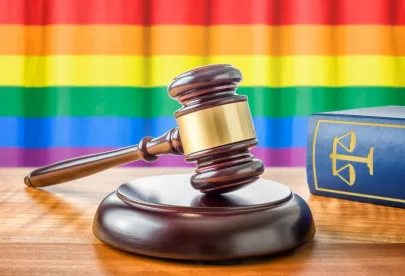On April 4, 2017, the Seventh Circuit Court of Appeals became the first federal appeals court in the United States to find that Title VII of the Civil Rights Act of 1964 prohibits discrimination on the basis of sexual orientation.
In Kimberly Hively v. Ivy Tech Community College, [1] Indiana professor Kimberly Hively sued her former employer, Ivy Tech Community College, for allegedly discriminating against her because of her sexual orientation. In an 8-3 en banc decision, the court reversed the district court, granted Hively and other gay and lesbian workers the right to sue over what they perceive as discriminatory employment practices based on their sexual orientation, and remanded the case for further proceedings. Chief Circuit Judge Diane P. Wood wrote in the majority opinion: “The Supreme Court’s decisions, as well as the common-sense reality that it is actually impossible to discriminate on the basis of sexual orientation without discriminating on the basis of sex, persuade us that the time has come to overrule our previous cases that have endeavored to find and observe that line.”
Of the states in the Seventh Circuit—Illinois, Indiana, and Wisconsin—only Indiana lacks a state law prohibiting discrimination on the basis of sexual orientation. Across the nation, twenty-four states have adopted laws that prohibit sexual orientation discrimination. Thus, while the Hively decision may not have immediate practical effects for many employers, it has created a split of authority among the federal circuit courts of appeal. Before Hively, every federal appeals court that had considered the issue had found that sexual orientation discrimination was outside the scope of Title VII. That may change soon.
Even though Ivy Tech has stated that it will not seek Supreme Court review, cases pending in the Second and Eleventh Circuits may ultimately bring the issue to the Supreme Court.
The Second Circuit recently held in a panel decision in Christiansen v. Omnicom Group, Inc. [2], that sexual orientation discrimination is not covered by Title VII. The court declined an invitation to reconsider its prior holdings in Simonton v. Runyon and Dawson v. Bumble & Bumble “in light of a changed legal landscape,” explaining that it was “bound by the decision of prior panels until such time as they are overruled either by an en banc panel of our Court or by the Supreme Court.” The court did, however, reinstate the plaintiff’s gender stereotyping claim, specifically that he was harassed and discriminated against on account of his effeminacy, clarifying recent confusion over whether claims based on stereotyping are distinct from those based on sexual orientation. This is not necessarily the end of the story in the Second Circuit. On April 10, the court granted Christiansen’s request to extend the time to file a petition for rehearing en banc until April 28.
On March 10, 2017, the Eleventh Circuit in Evans v. Georgia Regional Hospital [3] joined the majority of federal appellate courts in holding that sexual orientation discrimination is not actionable under Title VII. Evans worked as a security officer at Georgia Regional Hospital. She alleged that she was denied equal pay and work, harassed, and physically assaulted because of her sexual orientation and gender nonconformity. According to Evans, she presented herself in a masculine manner by wearing a male uniform, haircut, and shoes. Furthermore, she claimed she was subjected to a hostile work environment because her status as a lesbian did not comport with her superiors’ gender stereotypes. A federal magistrate judge initially dismissed the claims finding that neither the gender stereotyping claims nor the sexual orientation claims were cognizable under Title VII.
Evans argued that the U.S. Supreme Court has already held that both same-sex harassment claims and gender stereotyping claims are allowed under Title VII. She contended that these decisions should also include sexual orientation-based claims. [4] The Eleventh Circuit disagreed andheld that “binding precedent forecloses” an action based on sexual orientation discrimination under Title VII “unless and until it is overruled by this court en banc or by the Supreme Court.” However, it reversed the lower court in part and held that Evans’s gender stereotyping claim should not have been dismissed. The court noted that gender nonconformity claims are not “just another way to claim discrimination based on sexual orientation,” but rather a separate claim cognizable under Title VII. [5] The court held that Evans should be afforded an opportunity to amend her complaint to allege additional facts in support of her gender nonconformity claim.
All Employers Take Note
The decisions in Hively, Evans, and Christiansen increase the likelihood that the Supreme Court will be called upon to address this issue in the near term. This could result in nationwide protection for employees on the basis of their sexual orientation.
As a practical matter, these cases do not dramatically change the legal landscape for employers. Sex-stereotyping and gender identity [6] claims clearly remain viable avenues for employees discriminated on the basis of their sexual orientation outside the Seventh Circuit. Moreover, state laws and local ordinances in many jurisdictions provide explicit protections to employees based upon both their gender identity and sexual orientation.
Employers should reexamine their company policies and ensure that discrimination and harassment on account of an individual’s sexual orientation and gender identity are prohibited. Many employers already have broad policies in place that generally prohibit illegal discrimination or discrimination on the basis of legally protected characteristics. Those employers should consider explicitly listing sexual orientation and gender identity, along with race, sex, age, disability, et cetera. Furthermore, employers need to pay attention to whether their employee training materials are consistent with their current policies, and appropriately address LGBTQ issues in their workplaces.
[1] No. 15-1720, 2017 U.S. App. LEXIS 5839 (7th Cir. Apr. 4, 2017).
[2] No. 16-748, -- F.3d -- (March 27, 2017).
[3] 2017 WL 943925 (11th Cir. March 10, 2017).
[4] Price Waterhouse v. Hopkins, 490 U.S. 228 (1989) (holding that gender stereotyping constitutes discrimination on the basis of sex under Title VII); Oncale v. Sundowner Offshore Servs., Inc., 523 U.S. 75 (1998) (recognizing same sex sexual harassment claims as viable claims under Title VII).
[5] The Eleventh Circuit rested on the well established line of cases starting with Price Waterhouse, where the Supreme Court recognized that employment discrimination based on sex stereotypes (e.g., assumptions and/or expectations about how persons of a certain sex should dress, behave, etc.) is unlawful sex discrimination under Title VII. The employer in that case had denied the plaintiff a promotion in part because other partners at the firm felt that she did not act as woman should act. She was told, among other things, that she needed to "walk more femininely, talk more femininely, [and] dress more femininely" in order to secure a partnership. Id. at 230–31, 235. The court found that this constituted evidence of sex discrimination as "[i]n the . . . context of sex stereotyping, an employer who acts on the basis of a belief that a woman cannot be aggressive, or that she must not be, has acted on the basis of gender." Id. at 250. The court further explained that Title VII's "because of sex" provision strikes at the "entire spectrum of disparate treatment of men and women resulting from sex stereotypes." Id. (quoting City of Los Angeles Dep't of Water & Power v. Manhart, 435 U.S. 702, 707 n.13 (1978) (internal citation omitted)).
[6] See, e.g., Schwenk v. Hartford, 204 F.3d 1187, 1202 (9th Cir. 2000) (finding that discriminating against an employee for being transgender constitutes disparate treatment “related to the sex of the victim”); Smith v. Salem, 378 F.3d 566, 572 (6th Cir. 2004) (holding that a transgender individual who was suspended because of gender nonconforming behavior stated a claim for discrimination under Title VII); Glenn v. Brumby, 663 F.3d 1312, 1316 (11th Cir. 2011) (statements by employer that he considered it “inappropriate” for transgender employee to dress as a woman at work and found it “unsettling” that she would wear women’s clothing were direct evidence of discrimination based on gender in violation of Title VII).





 />i
/>i

